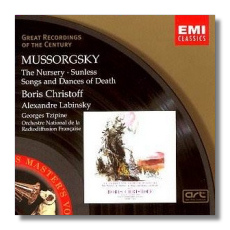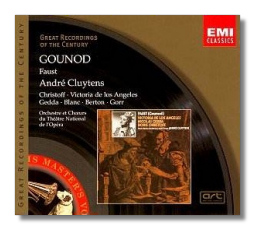
The Internet's Premier Classical Music Source
Related Links
- Latest Reviews
- More Reviews
-
By Composer
-
Collections
DVD & Blu-ray
Books
Concert Reviews
Articles/Interviews
Software
Audio
Search Amazon
Recommended Links
Site News
 CD Review
CD Review
Boris Christoff Sings

Modest Mussorgsky
- The Nursery
- Sunless
- Songs and Dances of Death (orch. Glazunov and Rimsky-Korsakov)
- Where are you, little star? Darling Savishna
- Lullaby
- King Saul (orch. Glazunov and Rimsky-Korsakov)
- Hopak
- The wild winds blow (orch. Labinsky)
- Song of the flea
Boris Christoff, bass
Alexandre Labinsky, piano
Orchestre National de la Radiodiffusion Française/Georges Tzipine
EMI Classics 67993 ADD monaural 78:59


Charles Gounod
Faust
- Nicolai Gedda (Faust)
- Victoria de los Angeles (Marguerite)
- Boris Christoff (Méphistophélès)
- Ernest Blanc (Valentin)
- Liliane Berton (Siebel)
- Rita Gorr (Marthe)
Orchestre et Choeurs du Théâtre National de l'Opéra/André Cluytens
EMI Classics 67967 ADD 3CDs: 50:51, 48:39, 72:54
This review of two new "Great Recordings of the Century" reissues is a tribute to the great Bulgarian basso Boris Christoff (1914-1993) who appears on both. As a young man, the king of Bulgaria paid Christoff's way to Italy, where he studied with baritone Riccardo Stracciari. Just as his career was getting underway, World War Two interrupted it, and he spent the latter part of the war in a prison camp in Salzburg. As a result, his professional debut (singing Wotan's Farewell) was delayed until 1945. By 1947, he was singing the role of Pimen in Boris Godunov, and eventually he would become famous for singing the haunted Tsar himself. (On both of his EMI recordings of that opera, Christoff controversially triple-casts himself as Pimen, Boris, and Varlaam!) Christoff's cavernous voice is immediately recognizable, as awesome – literally and figuratively – as the voice of God or the devil. In the flesh, he was temperamental, and on the stage, wildly dramatic. He was as close as his generation would come to a successor to Feodor Chaliapin.
His records were memorable. He recorded all of Mussorgsky's songs, or nearly so. Up until now, these recordings have been locked in a three-disc set, but now EMI has skimmed off the cream and thoughtfully reissued it, duly remastered, as a single CD. The three great song cycles – The Nursery, Sunless, and Songs and Dances of Death – are included here, plus a handful of the best songs, including "Song of the Flea." It is amusing to hear the man who so memorably portrayed Boito's and Gounod's literally devilish Méphistophélès and Mussorgsky's tortured Boris turn himself into a little boy (and his nanny!) in The Nursery. The effect is like the one produced by Arnold Schwarzenegger in the movie Kindergarten Cop. Some listeners complain that Christoff's rendition is grotesque, and I suppose it is, but it is unforgettable, and no other singer has revisited or reimagined his or her childhood with such relish! Deeply thoughtful in Sunless and both horrifying and implacable in Songs and Dances of Death, Christoff makes indelible marks here as well. "Song of the Flea" is a showpiece for the basso's humor and dramatic exaggeration.
A transliterated Russian text and translations are included in the booklet. The recordings were made between 1955 and 1957 and the sound has aged tolerably well, although not so well as on other recordings of that vintage.
In Faust, Christoff's interpretation of Méphistophélès has raised plenty of critical hackles: words such as "coarse" and "repellant" have been used over the years, although few have criticized his singing per se. Granted, Christoff's French is heavily accented, but this makes him an exotic devil. Who wants a middle-class French burgher with a pipe and a little dog? And also granted, he is a big ham. In his presence, one could rename the opera Méphistophélès with some justification. Still, this is an interpretation that defines the cliché "larger than life." My young years were scarred by the auditory horror of Christoff's devil slithering out from behind a church pillar in Act Four and frightening poor Marguerite with the words, "Non! Tu ne prieras pas!" ("No! You shall not pray!") In this role, Christoff is really beyond good and bad – he's a force of nature, and he demands to be heard.
This 1958 recording was a stereo remake of a monaural one made just a few years earlier – also with Gedda, de los Angeles, Christoff, and Cluytens. The new cast members were Gorr, Blanc, and Berton – all improvements from the earlier version. Gorr (a famous Dalila and Amneris) is luxuriously cast as Marthe, Blanc is a suave and manly Valentin – a real soldier! – and Berton is brilliant nearly to the point of twittering. She's not boyish by any stretch of the imagination, unless the boy in question is five years old! Nevertheless, her pre-pubescent Siebel sticks in the memory.
As for de los Angeles, it's remarkable how sweetly she can swing without lapsing into cuteness. Perhaps the melancholy timbre of her voice is what makes the difference. In the Jewel Song, she splats some notes and betrays the slightest bit of awkwardness, but elsewhere she is superb, from the lyricism of Act Three to the drama of the final trio. The ardent Gedda is a perfect partner. His youthful sound tightens at the top of his range, except when he mixes in head tone, as a good Frenchman would do! (Gedda, of course, is of Russian and Swedish parentage.) He has far more personality than tenors who have recorded the role since then, with the possible exception of Franco Corelli, and it can be argued that Corelli's personality is of entirely the wrong type! Conductor Cluytens expertly moves the action along
A few weird or blaring orchestral balances seem to be the fault of the engineers and not the conductor. Otherwise, the sound holds up well.
The booklet contains texts, translations, and an essay, the latter by Richard Osborne. The stereo era has not seen a better Faust, and there's much that's distinctive about this recording, so don't hesitate, if you haven't heard it until now!
Copyright © 2003, Raymond Tuttle


















